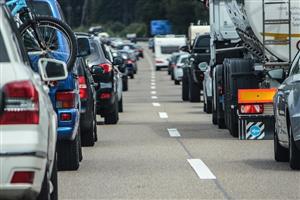
Climate change: Scientists fear car surge will see CO2 rebound
19/05/2020
Línea Verde
info@lineaverdemunicipal.com
Daily global emissions of CO2 fell by 17% at the peak of the shutdown because of measures taken by governments in response to Covid-19, say scientists. The most comprehensive account yet published says that almost half the record decrease was due to fewer car journeys. But the authors are worried that, as people return to work, car use will soar again. They fear CO2 emissions could soon be higher than before the crisis. They are urging politicians to grasp the moment and make real, durable changes on transport and personal mobility.
Coronavirus: Five charts about the biggest carbon crash
Download the updated BBC Energy Briefing (10.4MB)
Can coronavirus crisis spur a green recovery?
In the UK, Transport Secretary Grant Shapps has pledged £250m for improvements to cycling and walking infrastructure. Other countries are also looking at similar plans. The lockdowns that most governments have implemented in response to Covid-19 have had a significant impact on the carbon-producing activities that are embedded in almost everything we do. Road transport has declined hugely, as has aviation. However, now that the UK is beginning to return to work, Mr Shapps said people should drive to work rather than use public transport, should walking or cycling not be an option. "If you can't walk or cycle but you do have access to a car, please use it rather than travelling by bus, train or tram", he said.
Industry has temporarily closed down and demand for energy all over the world has crashed. Now in detailed analysis, researchers have shown how those changes have impacted our emissions of CO2. They've calculated the fall off in carbon based on the lockdown policies implemented in 69 countries that between them account for 97% of global emissions. During the peak of the crisis in early April, daily emissions dropped by 17% compared to the previous year, meaning around 17 million tonnes less CO2 were emitted every day. The key to the fall has been cars. Surface transport emissions have declined by 43%, the same amount as the drop from industry and power generation combined.
While the aviation slowdown has grabbed headlines for the economic impact, it only accounts for 10% of the decrease during the pandemic. China has been responsible for the biggest drop, followed by the US, Europe and India. If some restrictions on economic activity stay in place worldwide until the end of the year, then global emissions will likely drop by 7%. If pre-pandemic levels of transport and economic activity return by mid-June, the annual fall would be around 4%. But the research team that carried out this work is concerned that the rebound, especially on the roads, could see a carbon surge.
Matt McGrath / BBC

Environmental news
- What is COP28 in Dubai and why is it important?
- Climate change: How is my country doing on tackling it?
- COP27: Why the latest UN climate conference matters
- New oil and gas at odds with green goals - report
- World's biggest plant discovered off Australian coast
- Hubble: 'Single star' detected at record-breaking distance
- James Webb telescope parked in observing position
- Brexit paves the way for gene-edited crops
- Venus: Nasa announces two new missions
- Nature: Throwing money at biodiversity schemes is ineffective
- UK woodlands 'at crisis point' amid wildlife decline
- Nasa Mars rover: The clanking sound of Perseverance's wheels
- Climate change: 'Exceptionally hot' 2020 concludes warmest decade
- 'World's ugliest orchid' tops list of new discoveries
- Antarctic place names recognise 'modern explorers'
Cerrar [X]Uso de cookies
Utilizamos cookies propias y de terceros para mejorar nuestros servicios y recopilar datos estadísticos sobre hábitos de navegación. El uso de cookies es necesario para la notificación de incidencias. Si continúa navegando, consideramos que acepta su uso. Puede obtener más información, o bien conocer cómo cambiar la configuración, en nuestra Política de cookies



